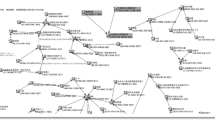Abstract
This study describes the characteristics of pre-service teachers’ discourse on a WebCT Bulletin Board in their investigations of local streams in an integrated mathematics and science course. A qualitative analysis of data revealed that the pre-service teachers conducted collaborative discourse in framing their research questions, conducting research and writing reports. The science teacher educator provided feedback and carefully crafted prompts to help pre-service teachers develop and refine their work. Overall, the online discourse formats enhance out-of-class communication and support collaborative group work. But the discourse on the critical examination of one another’s point of views rooted in scientific inquiry appeared to be missing. It is suggested that pre-service teachers should be given more guidance and opportunities in science courses in carrying out scientific discourse that reflects reform-based scientific inquiry.

Similar content being viewed by others
References
Abd-El-Khalick F (2001) Embedding nature of science instruction in pre-service elementary science courses: abandoning scientism, but…. J Sci Teacher Educ 12:215–233
Abell SK, Smith DC, Volkmann MJ (2004) Inquiry in science teacher education. In: Flick LB, Lederman NG (eds) Scientific inquiry and nature of science. Kluwer, Netherlands, pp 173–199
Adamson SL, Banks D, Burtch M, Cox F, Judson E, Turley JB et al (2003) Reformed undergraduate instruction and its subsequent impact on secondary school teaching practice and student achievement. J Res Sci Teach 40:939–957
Bell P, Linn M (2000) Scientific arguments as learning artifacts: designing for learning from the Web with KIE. Int J Sci Educ 22:797–817
Bransford JD, Brown AL, Cocking RR (2000) How people learn: brain, mind, experience and school. National Academy Press, Washington DC
Clark DB, Sampson VD (2007) Personally-seeded discussions to scaffold online argumentation. Int J Sci Educ 29:253–277
Cobb P, Bowers J (1999) Cognitive and situated learning perspectives in theory and practice. Educ Res 28(2):4–15
Corbin J, Strauss A (2008) Basics of qualitative research, 3rd edn. Sage, Newbury Park
de Vries E, Lund K, Baker M (2002) Computer-mediated epistemic dialogue: explanation and argumentation as vehicles for understanding scientific notions. J Learn Sci 11:63–103
Driver R, Newton P, Osborne J (2000) Establishing the norms of scientific argumentation in classrooms. Sci Educ 84:287–312
Duschl R (2008) Science education in three-part harmony: balancing conceptual, epistemic, and social learning goals. Rev Res Educ 32:268–291
Duschl RA, Osborne J (2002) Supporting and promoting argumentation discourse in science education. Stud Sci Educ 38:39–72
Ebenezer JV, Lugo F, Beirnacka B, Puvirajah A (2003) Community building through electronic discussion boards: pre-service teachers’ reflective dialogues on science teaching. J Sci Educ Technol 12:397–411
Gilmer PJ, Hahn L, Spaid MR (2002) Experiential learning for pre-service science and mathematics teachers: applications to secondary classrooms. SERVE, Tallahassee
Grandy R, Duschl R (2005) Reconsidering the character and role of inquiry in school science: Framing the debates. NSF inquiry conference proceedings. http://www.ruf.rice.edu/~rgrandy/NSFConSched.html. Accessed 25 November 2005
Haefner LA, Zembal-Saul C (2004) Learning by doing? Prospective elementary teachers’ developing understandings of scientific inquiry and science teaching and learning. Research report. Int J Sci Educ 26:1653–1674
Hogan K, Nastasi BK, Pressley M (1999) Discourse patterns and collaborative scientific reasoning in peer and teacher-guided discussions. Cogn Instr 17:379–432
Kelly GJ (2007) Discourse in science classrooms. In: Abell SK, Lederman NG (eds) Handbook of research on science education. Lawrence Erlbaum Associates, Inc, Mahwah, pp 443–469
Keys CW, Hand B, Prain V, Collins S (1999) Using the science writing heuristic as a tool for learning from laboratory investigations in secondary science. J Res Sci Teach 36:1065–1084
Krajcik J, Blumenfeld P, Marx R, Soloway E (2000) Instructional, curricular, and technological supports for inquiry in science classrooms. In: Minstrell J, van Zee EH (eds) Inquiring into inquiry learning and teaching in science. American Association for the Advancement of Science, Washington, DC, pp 283–315
McDermott LC (1990) A perspective on teacher preparation in physics and other sciences: the need for special science courses for teachers. Am J Phys 58:734–742
McGinnis JR, Kramer S, Shama G, Graeber AO, Parker CA, Watanabe T (2002) Undergraduates’ attitudes and beliefs about subject matter and pedagogy measured periodically in a reform-based mathematics and science teacher preparation programs. J Res Sci Teach 39:713–737
McNeill KL, Lizotte DJ, Krajcik J, Marx RW (2006) Supporting students’ construction of scientific explanations by fading scaffolds in instructional materials. J Learn Sci 15:153–191
National Research Council (1996) National science education standards. National Academy Press, Washington, DC
National Research Council (2000) Inquiry and the national science education standards: A guide for teaching and learning. National Academy Press, Washington, DC
National ResearchCouncil (2007) Taking science to school. The National Academies Press, Washington, DC
Polman JL, Pea RD (2001) Transformative communication as a cultural tool for guiding inquiry science. Sci Educ 85:223–238
Richardson GM, Liang LL (2008) The use of inquiry in the development of pre-service teacher efficacy in mathematics and science. J Elem Sci Educ 20(1):1–16
Slater TF, Safko JL, Carpenter JR (1999) Long-term attitude sustainability from a constructivist-based astronomy-for-teachers course. J Geosci Educ 47:366–368
Strauss A, Corbin J (1990) Basics of qualitative research. Sage Publications, Newbury Park
van Zee EH (1998) Preparing teachers as researchers in courses on methods of teaching science. J Res Sci Teach 35:791–809
Vygotsky LS (1978) Mind in society: the development of higher psychological processes. Harvard University Press, Cambridge (Original work published 1934)
White BY, Frederiksen JR (2000) Metacognitive facilitation: an approach to making scientific inquiry accessible to all. In: Minstrell J, van Zee EH (eds) Inquiring into inquiry learning and teaching in science. American Association for the Advancement of Science, Washington, DC, pp 331–370
Zembal-Saul C, Munford D, Crawford B, Friedrichsen P, Land S (2002) Scaffolding pre-service science teachers’ evidence-based arguments during an investigation of natural selection. Res Sci Educ 32:437–463
Author information
Authors and Affiliations
Corresponding author
Rights and permissions
About this article
Cite this article
Liang, L.L., Ebenezer, J. & Yost, D.S. Characteristics of Pre-Service Teachers’ Online Discourse: The Study of Local Streams. J Sci Educ Technol 19, 69–79 (2010). https://doi.org/10.1007/s10956-009-9179-x
Received:
Accepted:
Published:
Issue Date:
DOI: https://doi.org/10.1007/s10956-009-9179-x



